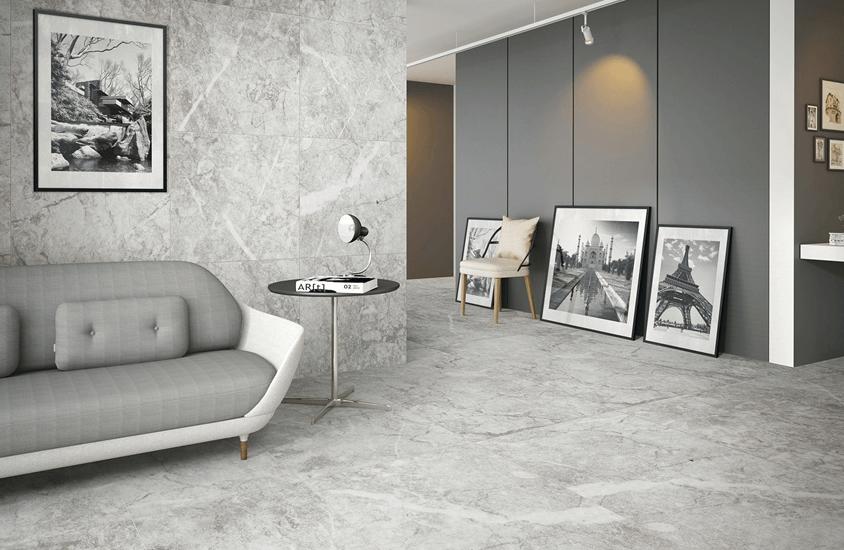
Polished porcelain tiles are a popular choice for homeowners due to their sleek and luxurious appearance. However, to keep these tiles looking their best and ensure their longevity, it's essential to understand how to clean and maintain them properly.
In this post, we'll walk you through the steps to clean and maintain polished porcelain tiles, from understanding their characteristics to troubleshooting common issues.
Polished porcelain tiles are a type of ceramic tile known for their glossy, reflective finish. They are made from fine clay and are fired at high temperatures to achieve their dense and durable nature. This finish not only adds a touch of elegance to your space but also makes the tiles less porous and more resistant to moisture and stains.
While polished porcelain tiles offer numerous benefits, they are not entirely maintenance-free. It's essential to understand their vulnerabilities and why proper maintenance is crucial:
●Vulnerabilities: Polished porcelain tiles, while resilient, can still be susceptible to dirt, grime, and scratches over time.
●Proper maintenance: Regular cleaning and maintenance are essential to preserve their luster and appearance, ensuring they continue to enhance your living space.

Before diving into the cleaning process, you'll need to gather some essential supplies:
●Microfiber mop: A microfiber mop is gentle on polished surfaces and effectively captures dust and dirt.
●pH-neutral cleaner: Choose a pH-neutral cleaner specifically designed for porcelain tiles to avoid damaging their finish.
●Bucket: A bucket is necessary for mixing the cleaning solution.
●Soft cloth or mop heads: Use soft cloths or mop heads to prevent scratching the tiles.
●Squeegee: A squeegee can help remove excess water during cleaning.
Gloves: Wear gloves to protect your hands from cleaning agents and chemicals.
Safety glasses: Safety glasses are essential when working with cleaning agents to shield your eyes from splashes.
Regular maintenance is the key to preserving the beauty of your polished porcelain tiles. Follow these steps for routine cleaning:
●Start by sweeping or dusting the tiles daily or as needed to remove loose dirt and debris.
●Use a microfiber mop or a soft broom to prevent scratching the surface.
●Pay special attention to high-traffic areas and areas prone to spills.
●Mix the pH-neutral cleaner with water in the bucket according to the manufacturer's instructions.
●Dip the mop or cloth into the solution and wring it out thoroughly to avoid oversaturation.
●Gently mop the tiles in a back-and-forth motion, working in small sections.
●Rinse the mop or cloth frequently and change the water as needed.
●Use the squeegee to remove excess water and prevent streaks.
Allow the tiles to air dry or use a dry cloth to remove any remaining moisture.
●For spills and stains, address them promptly by blotting and wiping with a clean, damp cloth.
●Avoid abrasive or acidic cleaners, as they can damage the polished finish.
If a stain persists, consult the manufacturer's guidelines or a professional for specific stain removal recommendations.

In addition to routine cleaning, deep cleaning should be performed periodically to maintain the tiles' brilliance:
Plan to deep clean your polished porcelain tiles every 2-3 months, depending on foot traffic and use.
●Choose a specialized porcelain tile cleaner compatible with your tiles.
●Follow the manufacturer's instructions for mixing and applying the cleaner.
●Apply the cleaner to the tiles and let it sit for the recommended time.
●Scrub the tiles gently with a soft brush or mop.
●Rinse thoroughly with clean water to remove any residue.
●Dry the tiles with a soft cloth or allow them to air dry.
Clean the grout lines between tiles using a grout cleaner or a mixture of baking soda and water.
Scrub gently with a grout brush to remove dirt and grime.
Rinse the grout thoroughly to prevent any leftover residue.
To ensure your polished porcelain tiles maintain their beauty and durability, consider these preventative measures:
Apply a suitable tile sealer to protect the tiles from stains and moisture.
Follow the sealer manufacturer's instructions for application and reapplication.
Place furniture protectors or felt pads under the legs of chairs, tables, and heavy furniture to prevent scratches and damage.
Lift and move furniture instead of dragging it across the tiled surface.
Create a routine maintenance checklist to ensure you stay on top of your tile care regimen.
Include tasks like sweeping, mopping, and checking for any signs of damage or wear.

Even with proper maintenance, issues may arise. Here's how to troubleshoot common problems:
For minor scratches, try using a porcelain touch-up kit to conceal imperfections.
For deeper scratches, consult a professional for advice on repair or replacement.
Research specific stain removal techniques for the type of stain you're dealing with.
When in doubt, seek professional guidance to avoid worsening the issue.
Maintaining the beauty and longevity of polished porcelain tiles requires diligence and care, but the results are well worth the effort. Regular cleaning, deep cleaning, and preventative measures will ensure that your tiles continue to enhance your living space and leave a lasting impression.
Whether you're enjoying the timeless beauty of polished porcelain tiles in your kitchen, bathroom, or any other area of your home, the key to their lasting appeal lies in proper maintenance. So, roll up your sleeves, gather your supplies, and let your tiles shine.